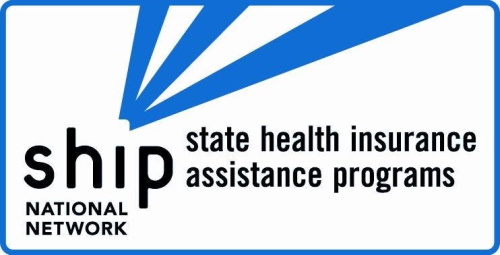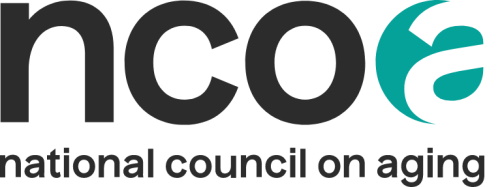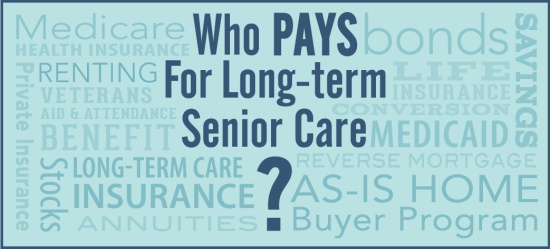Ways to Pays for Long-Term Care
semi-private and $7,092 for a private room.
What is Long-Term Care?
Long-term care
is a variety of services which help meet both the medical and
non-medical needs of people with a chronic illness or disability
who cannot care for themselves for long periods. Whether
delivered at home or in a hospital, assisted living facility, or
nursing home-depends on their financial situation and the kinds of
services they use. Often, they rely on a variety of payment
sources, including personal funds, government programs, and
private financing options. The following are ways to pay
for long-term care.
Personal Funds (Out-of-Pocket)
At first, many older adults pay for care
in part with their own money. They may use personal savings, a
pension or other retirement fund, income from stocks and bonds, or
proceeds from the sale of a home.
Most
home-based care is
paid for using personal funds ("out of pocket").
Initially, family
and friends often provide personal care and other services, such
as transportation, for free. But as a person's needs increase,
paid services may be needed.
Many older adults also pay
out-of-pocket to participate in adult day service programs, meals,
and other community-based services provided by local governments
and nonprofit groups. These services help them remain in their
homes to
age-in-place.
Professional care provided in assisted living
facilities and continuing care retirement communities is almost
always paid for out of pocket, though, in some states, Medicaid
(see below) may pay some costs for people who meet financial and
health requirements.
Introduced as nursing home insurance in
the 1980s,
long-term care insurance isn't like
traditional health insurance. The purpose of long-term care
insurance is to cover expenses associated with long-term senior
care services and support, whether the care is provided at home or
in an assisted living community, skilled nursing facility or other
senior care setting.
A long-term care insurance policy
reimburses the policyholder a preselected daily amount to cover
the cost of skilled nursing care; speech, physical and
rehabilitation therapy; and/or services used to assist them with
Activities of Daily Living (ADLs).
If you are eligible for both Medicare and Medicaid (dually eligible), you can have both. They will work together to provide you with health coverage and lower your costs
Medicare pays some medical costs for people age 65 and older, and for all people with late-stage kidney failure. It also pays some medical costs for those who have gotten Social Security Disability Income (discussed later) for 24 months. It does not cover ongoing personal care at home, assisted living, or long-term care.
Here are brief descriptions of what Medicare will
pay for:
Medicare Part A:
-
Hospital costs after you pay a certain amount, called the "deductible"
-
Short stays in a nursing home to get care for a hospital-related medical condition
-
Hospice care in the last 6 months of life
Medicare Part B:
-
Part of the costs for doctor's services, outpatient care, and other medical services that Part A does not cover
-
Some preventive services, such as flu shots and diabetes screening
Medicare Part D:
-
Some medication costs
Call Medicare at 1-800-633-4227, TTY:
1-877-486-2048 to find out what costs Medicare will cover for your
situation, or visit the Medicare website for more information.
 Medicaid is one of the most common
ways to pay for a nursing home when you have no money available.
Even if you have had too much money to qualify for
Medicaid in the past, you may find that you are eligible for
Medicaid nursing home care because the income limits are higher
for this purpose.
Medicaid is one of the most common
ways to pay for a nursing home when you have no money available.
Even if you have had too much money to qualify for
Medicaid in the past, you may find that you are eligible for
Medicaid nursing home care because the income limits are higher
for this purpose.
Some people may qualify for Medicaid, a
combined Federal and State program for low-income people and
families. This program covers the costs of medical care and some
types of long-term care for people who have limited income and
meet other eligibility requirements. Who is eligible and what
services are covered vary from State to State.
To learn
more about Medicaid, call 1-877-267-2323, TTY: 1-866-226-1819, or
visit the Medicaid website. Or, contact your State health
department. For a State-by-State list, visit Medicaid's State
Overviews page.

The Programs of All-Inclusive Care for the Elderly (PACE) provides comprehensive medical and social services to certain frail, community-dwelling elderly individuals, most of whom are dually eligible for Medicare and Medicaid benefits. An interdisciplinary team of health professionals provides PACE participants with coordinated care. For most participants, the comprehensive service package enables them to remain in the community rather than receive care in a nursing home.
Texas Program of All-Inclusive Care for the Elderly (PAC) provides comprehensive medical and social services to certain frail, community-dwelling elderly individuals, most of whom are dually eligible for Medicare and Medicaid benefits.
The PACE Model of Care is centered on the belief that it is better for the well-being of seniors with chronic care needs and their families to be served in the community whenever possible.
Programs of All-Inclusive Care for the Elderly (PACE) serve individuals who are age 55 or older, certified by their state to need nursing home care, able to live safely in the community at the time of enrollment, and live in a PACE service area.
Delivering all needed medical and supportive services, a PACE program provides the entire continuum of care and services to seniors with chronic care needs while maintaining their independence in their home for as long as possible.
Services include the following:
-
adult day care that offers nursing; physical, occupational and recreational therapies;
-
meals; nutritional counseling; social work and personal care;
-
medical care provided by a PACE physician familiar with the history, needs and preferences of each participant;
-
home health care and personal care;
-
all necessary prescription drugs;
-
social services;
-
medical specialties, such as audiology, dentistry, optometry, podiatry and speech therapy;
-
respite care; and
-
hospital and nursing home care when necessary.
To find out more about PACE, call 1-877-267-2323, or visit the PACE website.

The State Health Insurance Assistance Program is a national program offered in each State that provides counseling and assistance to people and their families on Medicare, Medicaid, and Medicare supplemental insurance (Medigap) matters. To contact a SHIP counselor in your State, visit the SHIP National Technical Assistance Center website.

The U.S. Department of Veterans Affairs
(VA) may provide long-term care or at-home care for some veterans.
If your family member or relative is eligible for veterans'
benefits, check with the VA or get in touch with the VA medical
center nearest you. There could be a waiting list for VA nursing
homes.
To learn more about VA healthcare benefits, call
1-877-222-8387, or visit the Veterans Health Administration or the
Veterans Affairs Caregiver Support page. You can also find more
information at Geriatrics and Extended Care: Paying for Long-Term
Care.
 Veterans
Aid & Attendance and Housebound
Veterans
Aid & Attendance and Housebound
 VA
Caregiver Support Program
VA
Caregiver Support Program

This type of Social Security is for people
younger than age 65 who are disabled according to the Social
Security Administration's definition.
For a person to
qualify for Social Security Disability Income, he or she must be
able to show that:
-
The person is unable to work
-
The condition will last at least a year
-
The condition is expected to result in death
Social Security has "compassionate allowances" to help people with Alzheimer's disease, other dementias, and certain other serious medical conditions get disability benefits more quickly.
To find out more about
Social Security
Disability Income call 1-800-772-1213, TTY:
800-325-0778 or
visit the Social Security Administration.

The National Council on Aging, a private group, has a free service called BenefitsCheckUp. This service can help you find Federal and State benefit programs that may help your family. After providing some general information about the person who needs care, you can see a list of possible benefit programs to explore. These programs can help pay for prescription drugs, heating bills, housing, meal programs, and legal services. You don't have to give a name, address, or Social Security number to use this service.
Source: https://www.nia.nih.gov/health/paying-care
Related Articles:
- How to Choose a Nursing Home
- State Nursing Home Inspection Reports (Source: Pro Publica)
- Nursing Homes vs. Assisted Living
- Find and Compare Nursing Homes
Home | About | Articles | Resources | Site Map | Privacy Policy
Elder Options of Texas
Copyright 2001-2024
All Rights Reserved
DISCLAIMER: Links to other websites or references to products, services or publications do not imply the endorsement or approval of such websites, products, services or publications by Elder Options of Texas. The determination of the need for senior care services and the choice of a facility is an extremely important decision. Please make your own independent investigation.





